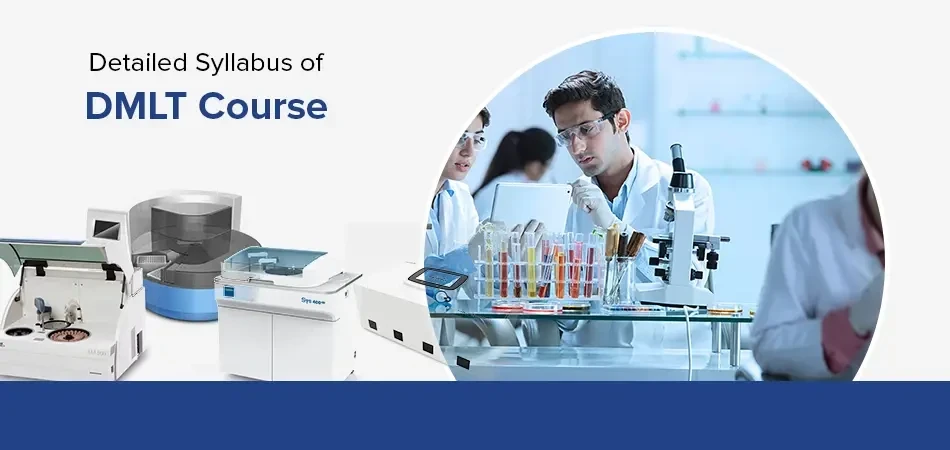Detailed Syllabus of DMLT Course

What is Diploma in MLT (DMLT)?
DMLT is a Diploma in Medical Laboratory Technology. It is a 2-year course, you need to be of the medical stream to opt for the course. In the DMLT course, techniques that are medically efficient are taught so that the personnel can develop skills in medical diagnostic types of machinery.
Best Place to Get DMLT Admission?
The best place to study your paramedical diploma course, DMLT course is Ganesh Paramedical College. It is affiliated with Bir Tikendrajit University, NABL, NIOS, NABH, and Singhania University. Ganesh Paramedical College represents excellence in the paramedical field every year.
What Is The Syllabus of DMLT Course?
Let us discuss the Syllabus Year wise
- In the First year: Both Practicals and Theory constitutes 200 marks (100 each). It contains subjects that are below mentioned.
- Anatomy
- Pathology
- Biochemistry
- Microbiology
- Physiology
- In the Second year: Both Practical and Theory and Practical marks constitute 200 marks (100 each). Second year has below mentioned subjects-
- Anatomy
- Pathology
- Biochemistry
- Microbiology
- Physiology
Detailed Syllabus of 1st Year
Anatomy Theory
- Structure, bones,and skeleton of the body of human
- Respiratory Organs
- Muscles
- Digestive Organs
- Circulatory Organs
- Reproductive Organs Introduction
- Excretory Organs
- Liver
- Spleen
Anatomy Practical:
Labelled Diagrams of different bones and organs
Pathology Theory
- The Cell in health
- Neoplasia
- Cell disease
- Infection,
- Ischaemia,
- Formation of Blood- It contains Thrombopoiesis, Erythropoiesis, Leucopoiesis,
- Anticoagulants,
- Haemocytometer
- Body Fluids
- Calculation methods of WBC Count
- ESR Methods
- Staining procedures
- Microscopy Cell: It includes Semen Analysis, Count Staining, Collection, Special Tests, Examination.
Pathology Practical:
- Sample collection
- Hb estimation
- TLC count
- DLC count
- RBC Count
- Laboratory management
- Urine, Semen, Stool, and C.S.F. – Collection, Examinations, and Handling
Biochemistry Theory
- Inorganic chemistry constitutes Atomic weight, equivalent weight, molecular weight, acid, and bases.
- Percent solution
- Normal Solution
- Molar solution
- Buffer Solution etc.
- Definition and preparation of Regent.
- Unit of measurement
- Organic chemistry contituting Organic compounds, Aromatic and Aliphatic compounds, Alcohols, Ketones, Aldehydes, Amines, Phenol, Esters, etc, Ph indicators
Biochemistry Practical
- Usage of Glassware
- Usage of Instruments
- Separation of serum/plasma preservation
- Disposal of Biological material.
- Chemical examination of urine including its Qualitative analysis, Sugar analysis, Protein analysis, Bile Salt analysis, Bile Pigment analysis, and Ketones Bodies analysis
- Chemical examination of Stool: Occult Blood.
- Chemical examination of other Body Fluids like the CSF, Ascitic Fluid, Pleural Fluids,etc.
Microbiology Theory
- Historical Aspect; Micro-organism to men relationship, Micro-organism present in Disease
- Laboratory Equipments handling and using including-
- Sterilisation : Autoclave
- Fungus : Definition Structure Classification
- Bacteriology, Virology, Parasitological
Microbiology Practical
- Staining,
- Demonstration of washing of instruments
Physiology Theory
- Surface Tension
- Colloid
- Diffusion
- Dialysis
- Adsorption
- Osmosis
- Filtration
- Bonding
- Fundamentals of all Organs
- Studying Systems: Respiratory System, Cardiovascular System, Digestive System, Reproduction System, Excretory System, Lymphatic System, Endocrine System.
Physiology Practical
- Diagrams of important Vital Organs
Detailed Syllabus of 2nd Year
Physiology Theory
- Blood
- Leucocytes
- Erythrocytes
- Thrombocytes
- Blood Clotting Mechanism
- CSF or Cerebrospinal Fluid
- Special Senses: Taste, Hearing, Touch, Smell, Sight
Physiology Practical
- Corpuscles diagrams
Pathology Theory
- Blood group of humans
- Blood Changes on Storage
- Antibodies and Antigens
- ABO Blood grouping
- Antigens source and antibodies types
- Rh Blood grouping System
- Blood Collection, screening of donor and selecting
- Various anticoagulants
Pathology Practical
- Blood grouping methods,
- Tube Method,
- Slide Method
Biochemistry Theory
- Carbohydrates
- Lipids
- Protein
- Enzymes and Coenzymes
- Amino acids
- Electrolytes
- Protein
- Estimation of KFT
- Hormones
- RNA, DNA, Gene coding, Translation, and Transcription
- Genetic Disorders
Biochemistry Practical
- Method for
- Urea estimation,
- Creatinine,
- Cholesterol,
- glucose,
- Benedict's Reaction,
- Glucose Oxidase Method
Microbiology Theory
- Bacteria Staining
- Microorganism Cultivation
- Laboratory culture media Composition
- Inoculation and isolation Techniques
- Anaerobic cultivation techniques
- Antimicrobial sensitivity
- Viruses isolation in Laboratory
- Animal cell culture principle
- Use of Virology
- Staining techniques in Virology
- Different serological test Principles in Virology
- Transmission Mode of Viral agents
- Viral disease Prevention
- Immunology
Microbiology Practical
- VDRL test
- WIDAL test
- ASO
- CRP test
- Stool test
- Pus Cells
- Hanging Drop Examination
- Staining,
- Media Preparation
Anatomy Theory
- Reproductive Organs study
- Studying Liver
- Studying Spleen
- Studying Gall bladder
- Excretory Organs study
- Muscles study
Anatomy Practical
- Organs and bones diagrams
For more details about fees structure, scholarships, and education loan schemes visit: Ganesh Paramedical College or call at :- 011-47333333, 9811067479
Hurry up! There are very few seats available for the hands-on DMLT course! Register now!

